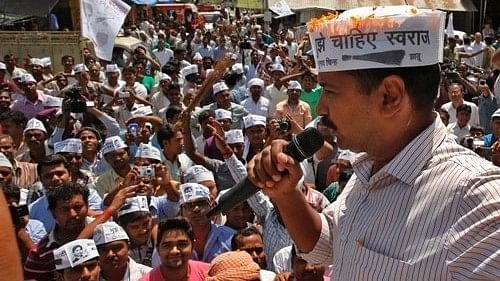
AAP's Arvind Kejriwal addresses supporters.
Credit: PTI photo
In a political landscape rife with manoeuvring and shifting allegiances, Bihar Chief Minister Nitish Kumar's departure from the I.N.D.I.A. bloc to align with the Bharatiya Janata Party-led National Democratic Alliance (NDA) serves as a poignant cautionary tale for the Opposition.
It underscores the need for astute navigation amidst the turbulent currents of Indian politics. With Kumar's move, attention inevitably turns to the tactics of Aam Aadmi Party (AAP) national convenor and Delhi Chief Minister Arvind Kejriwal. His recent actions in I.N.D.I.A., especially towards the Congress, must be viewed with a discerning eye; his allegiance lies not with any natural affinity for the alliance, but with a shrewd understanding of AAP’s vulnerabilities. Indeed, the BJP-led government's relentless pressure on AAP has pushed Kejriwal into a corner, forcing him to seek refuge within I.N.D.I.A.
AAP’s alliance with I.N.D.I.A. is one of convenience, a means to an end rather than a steadfast commitment. The Opposition, particularly the Congress, must remain vigilant. Kejriwal's decision to contest independently in the assembly elections in Punjab and Haryana serves as a stark reminder of Kejriwal’s opportunistic approach to politics. Should his immediate objectives be met, there's no guarantee he'll remain tethered to the Opposition's cause. As Kumar's defection illustrates, in the volatile arena of Indian politics, alliances are often transient, and self-interest reigns supreme.
The ongoing tango between the Congress and AAP over seat-sharing might just be a prelude to another political heartbreak. Remember 2019? Back then, Kejriwal twirled the alliance talks narrative only to blame Congress leader Rahul Gandhi and walk away at the last minute. There was even a joint press conference at Sharad Pawar’s residence by Kejriwal, Gandhi, and other opposition leaders. But the outcome was AAP's U-turn within a month.
The Opposition needs more than photo-ops and platitudes. It needs a rock-solid pact, forged in trust and not opportunism. AAP-Congress bonhomie might be good for the cameras, but it's their commitment to a genuine alliance that will determine the future course. Until then, keep your confetti handy, but leave the champagne unopened. This political salsa might just turn into a messy tango of betrayal again.
AAP has undoubtedly had a meteoric rise in Indian politics, to even becoming a national party. Its grassroots appeal, coupled with Kejriwal's charisma, has propelled it to power in Delhi, and Punjab, and garnered significant attention across India. However, beneath the shiny veneer of this success lie some undeniable limitations that raise questions about its long-term sustainability. While AAP dominates Delhi's state politics, its Lok Sabha performance paints a contrasting picture. The party hasn't managed to win a single Lok Sabha seat in the national capital despite holding a comfortable majority at the state level. This disconnect raises questions about its ability to translate its regional appeal into national electoral gains. The party’s performance in Goa, and Gujarat, is of some solace, but nothing to rely on.
Even in Punjab, where AAP swept the assembly elections in early 2022, doubts linger. The party's failure to retain Chief Minister Bhagwant Mann's Sangrur Lok Sabha seat just a month after his victory was a worrying sign. It indicates potential cracks in its Punjab armour, casting a shadow over its prospects in the state.
AAP's political ventures in Karnataka, Telangana, and Rajasthan have yielded disappointing results. Its performance has even fallen short of NOTA, highlighting its struggle to gain traction outside its comfort zones.
While its rise has been remarkable, its geographic constraints, Lok Sabha disconnect, and inconsistent performance outside Delhi-Punjab raise questions about its ability to sustain its momentum and translate its regional success into a national force.
AAP’s decision to go alone in Punjab could threaten the BJP-SAD alliance, but, and more importantly, it will keep the party relevant in the I.N.D.I.A. camp. By limiting the Congress’ options in Punjab, AAP could be doing the BJP a favour, which the ruling party in the state could cash in later.
Nitish Kumar's volte face lays bare the truth: loyalty and ideology are expendable in today’s politics. The I.N.D.I.A. allies must be cautiously alert to this reality. While AAP craves its national cloak for Lok Sabha glory, the Congress needs regional allies who share the same political philosophy — and not another opportunist waltz. Kejriwal needs the Congress (and I.N.D.I.A.) more than the other way around.
(Sayantan Ghosh teaches journalism at St Xavier's College (Autonomous), Kolkata. Twitter: @sayantan_gh)
Disclaimer: The views expressed above are the author's own. They do not necessarily reflect the views of DH.